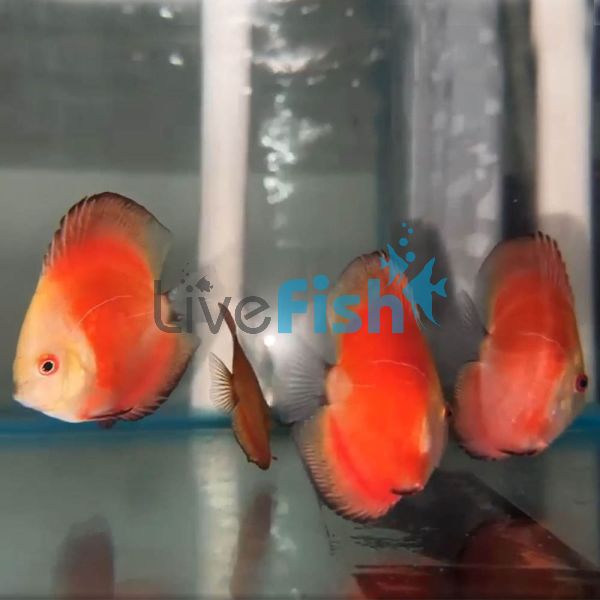Red Melon Discus 7cm
Red Melon Discus
Red Melon discus is easily one of the most popular, readily available, and vibrant discus strains in the hobby. They have striking colours, including a deep red not seen that commonly in other aquarium fish, and their simplicity is quite possibly what makes them such a popular strain. These are a captive-developed strain, and they will be well suited to aquarium life, but they are most certainly not a beginner fish to consider.
Being one of the world's best display aquarium fish, discus are often regarded as the pinnacle fish of the freshwater aquarium hobby and are highly sought after. The Red Melon discus as the name suggests is almost 100% covered in this deep tomato red colour which is especially bold when these fish are fully matured. The only real break to these colours is the pale, cream face these fish have which fades into tinges of yellow. The red eye rim colour is also incredibly striking; these fish are truly the epitome of contrast.
When kept in an optimal environment and healthy, these discus are breathtaking. Just like any other discus, the Red Melon strain have slightly different care requirements compared to other aquarium fish, primarily their temperature. Discus need elevated aquarium temperatures of around 28-30 degrees to thrive and also can be very sensitive to water parameters making them a challenge to keep. They are however very peaceful fish and can be kept with a wide range of community tank mates which can tolerate the warmer waters. Trying to find males and females in discus is a very difficult task as there are no immediate distinguishing factors. If a breeding attempt is made, then it is better to get a group of at least 5-6 and let them pair off naturally. The wild discus originates from the Amazon basin and has very different colours from the Red Melon discus.
Tank Recommendations for your Red Melon Discus
Red cover discus is a large growing fish reaching around 20 cm, both long and tall. Because of this, they do need a relatively large aquarium of around 250 litres, it is recommended to go larger when keeping Discus because a larger water volume will mean more stable conditions which is what discus prefers. Tank dimensions are also important when keeping discus, an aquarium with both height and length is needed because of the large profile that the discus grows to.
Discus can be a shy fish at times so an aquascape which provides both cover and also open swimming space will be best appreciated by them. These Red Melon discus also love plants in the aquarium which will also make them stand out really well. Another great setting for this strain specifically is to put them in an aquarium with a blue background which contrasts immensely against the red but really makes the fish stand out.
Suitable Tank Buddies
The Red Melon Discus is a very peaceful fish. Discus are ever so slightly territorial however this will never be a concerning factor of their behaviour. These fish will get along with a wide range of community fish. Fast-moving fish however should be avoided because they may outcompete the discus for food.
Usually Compatible
Cardinal tetras, German blue rams, Corydoras, and other common slow-moving peaceful fish.
Sometime Compatible
Fin nipping species such as barbs, fast-moving or larger-bodied tetras, and cichlids such as black widow tetras. Shrimp may also be sometimes compatible with discus.
Rarely Compatible
Large aggressive species such as African cichlids, Oscar, and Jaguar cichlids.
Feeding your Red Melon Discus
Red Melon Discus may be shy when first introduced but should take to prepared aquarium foods easily. Their ideal diet needs to consist of a good quality pellet or flake which is supplemented with frozen or live invertebrate-based foods like brine shrimp or black worms.
| Scientific Name | Symphysodon sp. |
|---|---|
| Care Level | Hard |
| Common Names | Red Melon Discus |
| Diet | Omnivore |
| Fish Family | Cichlidae |
| Lifespan (years) | 10 |
| Max. Length (cm) | 20 |
| Min. Tank Volume (l) | 250 |
| Origin | South America |
| Sociability | Peaceful |
| Venomous | No |
| Water Conditions | 28-30° C, pH 6.0-7.0 |




